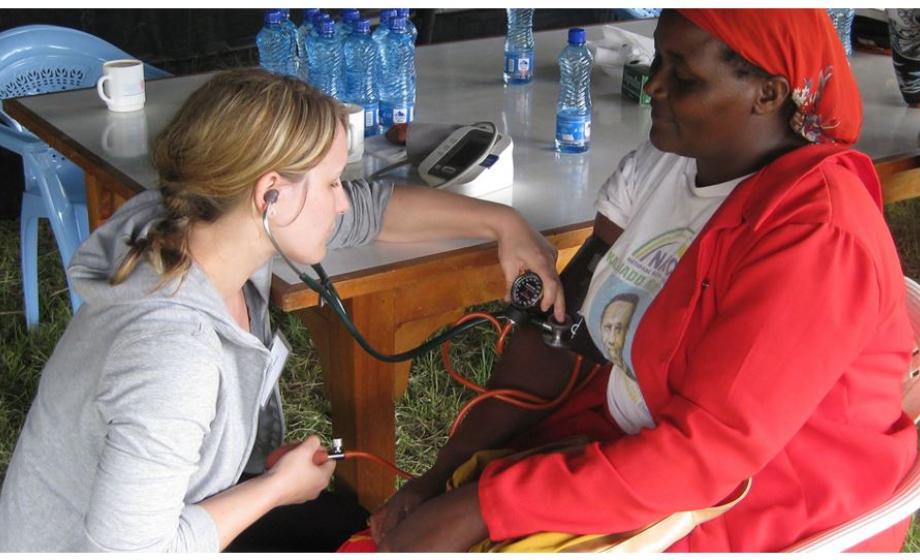Clark launches Community and Global Health Program

Clark University has launched the Henry J. and Erna D. Leir Master of Health Science in Community and Global Health program, offered through the International Development, Community, and Environment Department (IDCE) beginning in August 2017.
The M.H.S. program, which was created with the help of a $500,000 grant from the Leir Charitable Foundations, will provide students with the choice of concentrating in community health or global health, although all students will be exposed to aspects of both, according to Marianne Sarkis, M.H.S. program coordinator and assistant professor in IDCE.
Clark awards merit-based fellowships for full-time students, with funding for partial and full tuition while enrolled in the program. For full consideration, applicants are encouraged to apply by May 5.
“Public health’s ‘business as usual’ approach of prevention, intervention and health promotion is no longer keeping up with rapidly changing health trends,” Sarkis said. “Instead, we must respond in ways that prioritize the needs of those who have no access to health care and who carry the biggest burden of disease as a result of poverty and other social inequities.”
IDCE’s innovative approach combines scholarship with practice, emphasizing the factors that lead to health inequities and disparities, Sarkis noted. In addition, students must learn to engage stakeholders through partnerships with faculty, students, community members, and community organizations.
“The M.H.S. program will enable students to apply what they learn in the classroom and through research to health challenges taking place not only locally, but throughout the world. The new program is ideal for students who are committed to health care as a right, not a privilege, and who are passionate about reducing health disparities and inequities for all members of society.”
—Prof. Marianne Sarkis
Students who choose a community health concentration will focus on concerns such as healthy nutrition and active living, community mental health, law enforcement partnerships to reduce community violence, and other factors that impede people’s ability to live healthy lives in the United States. Students will also learn how community health monitoring and evaluation, and national policies, influence how people and communities experience health and care.
Those who choose a global health concentration will focus on issues in developing countries, such as access to basic services like water and sanitation; maternal mortality; the spread of infectious diseases, such as Zika virus; innovations in health care and health promotion; and the increase of non-infectious diseases like diabetes and hypertension. Students also will learn about the outcomes and frameworks of the United Nations’ Sustainable Development Goals to promote good health and well-being.
To earn their M.H.S., students will be required to complete three core courses, seven electives in an area of specialization, a practicum or field training project, and an integrative project. Required courses include Approaches to Community or Global Health, Epidemiology and Biostatistics, and Heath (In)equity: Social Determinants and Policy Solutions.
“Given the many factors that affect a person’s health, the study of community and global health is by necessity transdisciplinary, combining natural science and technology with social science and policy,” IDCE Director Edward Carr said. “Social, economic, cultural, environmental and political factors all affect health care and health access. Students in the program will learn how to use all of these factors to address community and global health challenges.”
Carr added that the M.H.S. program builds upon a long tradition at Clark of developing partnerships within the local community. Faculty and students have worked on projects that created alliances with local health departments, universities, law enforcement officers, and social service agencies. Together, they have addressed topics such as environmental impacts on children’s health, reduction of community violence, prevention of sexually transmitted infections, and harm-reduction strategies in responding to the opioid epidemic.
Additional information and application requirements are available online or contact the Graduate Admissions Office at gradadmissions@clarku.edu or 508-793-7373 to schedule a personal appointment.
About Clark University’s IDCE Department
Clark University’s International Development, Community, and Environment Department (IDCE), which is based in Worcester, Mass., is a community of scholars and practitioners dedicated to environmental sustainability, social justice and economic well-being. IDCE focuses on major forces of social change: grass roots initiatives, social movements, government policy, market approaches, entrepreneurship, technological innovation, individual action and education. In addition to the new Henry J. and Erna D. Leir Program in Community and Global Health, IDCE offers programs in International Development and Social Change, Environmental Science & Policy, Geographical Information Sciences for Development and Environment, and Community Development and Policy. Additional information is available at www2.clarku.edu/departments/international-development-community-environment


